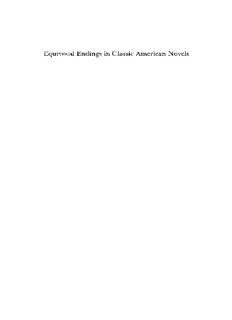
Equivocal Endings in Classic American Novels: The Scarlet Letter; Adventures of Huckleberry Finn; The Ambassadors; The Great Gatsby PDF
Preview Equivocal Endings in Classic American Novels: The Scarlet Letter; Adventures of Huckleberry Finn; The Ambassadors; The Great Gatsby
Equivocal Endings in Classic American Novels Equivocal Endings in Classic American Novels The Scarlet Letter; Adventures of Huckleberry Finn; The Ambassadors; The Great Gatsby JOYCE A. ROWE The right of the University of Cambridge to print and sell all manner of books was granted by Henry VIII in 1534. The University has printed and published continuously since 1584. Cambridge University Press Cambridge New York Port Chester Melbourne Sydney Published by the Press Syndicate of the University of Cambridge The Pitt Building, Trumpington Street, Cambridge CB2 1RP 40 West 20the Street, New York. NY 10011, USA 10 Stamford Road, Oakleigh, Melbourne 3166, Australia © Cambridge University Press 1987 First published 1988 Reprinted 1988, 1989, 1990 British Library Cataloguing in publication data Rowe, Joyce A. Equivocal endings of classic American novels: The scarlet letter, Adventures of Huckleberry Finn, The ambassador, The great Gatsby. 1. American fiction — 19th century — History and criticism. 2. American fiction — 20th century — History and criticism I. Title 813'.009 PS377 Library of Congress cataloguing in publication data Rowe, Joyce A. Equivocal endings of classic American novels. Bibliography. Includes index. 1. American fiction — History and criticism. 2. Closure (Rhetoric). 3. Ambiguity in literature. I. Title PS374.C56R68 1988 813'.009 87-15868 ISBN 0 521 33532 9 Transferred to digital printing 2004 GG For Claudia, Nina and Gerry Contents Acknowledgments page ix Introduction i 1 Nathaniel Hawthorne: "My Kinsman, Major Molineux": The Several Voices of Independence 14 2 Bleak Dreams: Restriction and Aspiration in The Scarlet Letter 27 3 Mark Twain's Great Evasion: Adventures of Huckleberry Finn 46 4 Strether Unbound: The Selective Vision of Henry James's Ambassador 75 5 Closing the Circle: The Great Gatsby 100 Conclusion: Moby-Dick and Our Problem with History 127 Notes 138 Index 159 Vll Acknowledgments This book began as a doctoral dissertation written under the direction of Quentin Anderson, now Professor Emeritus of Columbia University. It gives me great pleasure and pride to express my debt to him. His commitments, judgments and deep learning have taught me what humanistic scholarship and criti- cism can mean. Despite the pressure of his own responsibilities, he has been selfless in his attention to the entirety of this project. Rigorous as he is kind and caring, his challenges have enlivened my work and sustained my spirit at every turn. Readers of this work may recognize how much I also owe to Sacvan Bercovitch, an inspiriting and generous teacher, whose powerful ideas about American culture have stimulated me to explore new perspectives on many traditional themes. Professor Bercovitch has kindly read and commented upon part of this manuscript. Werner Sollors saw the manuscript in its initial stages and offered much valuable advice. Carl Hovde has been an astute reader throughout. His suggestions and commentary have been extremely helpful. I would like to express very special thanks to Jack Salzman, Director of the Center for American Culture Studies, Columbia University. His judgment and enthusiasm made it possible to transform an academic dissertation into a book. For a grant from the Elliott V. K. Dobbie Fund to aid in pre- paring the manuscript for publication, I am grateful to the Graduate Department of English and Comparative Literature, Columbia University. Finally, I want to applaud my family for their unflagging good cheer and self-reliance, for respecting my long hours of solitude, and for their spontaneous faith that the free mind provides its own reward. IX Introduction i To the passionate reader, the ending of a good story is a mixed blessing. For though we demand endings to confirm or complete our sense of relations within a story and so make a work fully signify, an ending, like its real life counterpart, also entails a sense of loss, of emptiness - a little death, as it were. In this sense, fic- tional endings, whatever their ostensible resolution, are inherently equivocal. In fulfilling our desire for a world of "charged meanings" and singular events they recapitulate the wisdom of Prospero - reminding us that the meaning we seek is a vision we impose; that our finest aspirations are generated from the "baseless [and varied] fabric" of our dreams.1 Shakespeare's The Tempest is associated with the Elizabethan voyages to the New World and the Utopian ideals rekindled by its discovery.2 But when Prospero breaks his staff, resigns his powers, and returns to the world of the Renaissance state, he confirms his audience (and their English descendants) in a more restrictive sense of human possibility, and reality, than that which their American cousins were to evolve on their side of the Atlantic ocean. For des- pite cross-currents and interpenetrating influences between the two continents, by the mid-nineteenth century when, it is generally recognized, American writers had found their own style and voice, their formal as well as thematic concerns were generating a decidedly different literature from that produced by comparable Writers abroad. Nowhere, perhaps, is this more evident than in the pattern of the endings of classic American novels and their troubling relation to the narrative which precedes them. These endings are equivocal in a special thematic sense, as they simultaneously promote and deny a visionary ambition already defeated in the body of the work. Neither tragic, comic nor ironic, they are, rather deliberately evasive, eluding those truths of experience, of both self and world, which the preceding narrative has been at pains
Description: